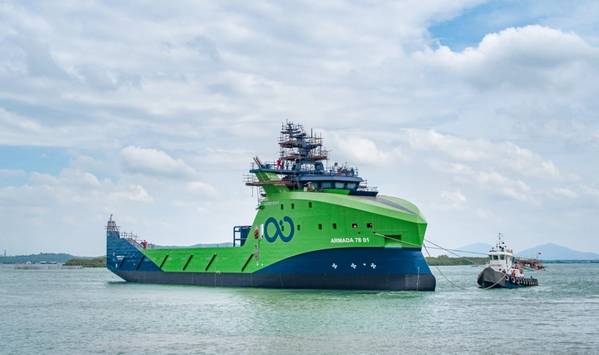
Cummins is working with partners in the U.K. to develop and deploy a methanol conversion kit for an engine aboard an Ocean Infinity offshore support vessel (OSV) as the maritime industry works toward transitioning to cleaner fuels.
The engine manufacturer announced its proposal to jointly develop a Methanol Kit for its QSK60 engine was selected to receive funding as part of the Zero Emission Vessels and Infrastructure (ZEVI) competition, funded by the U.K. government and delivered in partnership with Innovate UK.
Project stakeholders will use the £4.4 million (approximately $5.4 million) to deploy a U.K.-designed and built methanol conversion kit for a high-horsepower marine internal combustion engine aboard one of Ocean Infinity's Armada 78-meter lean-crewed hybrid OSVs.
The vessel will serve as a platform for Cummins to design, develop and test its methanol technology as well as dual fuel HVO (hydrotreated vegetable oil) after announcing approval of unblended paraffinic fuels — often referred to as renewable diesel including HVO — in all its high horsepower engines for all industrial applications earlier this year.
Mark Bargent, Cummins Technology Architecture and Planning Director. “We remain committed to helping the maritime sector reach its goal of 50% reductions in greenhouse gas emissions by 2050, as required by the IMO. To get there, shipbuilders need a roadmap for their decarbonization plans.”
Ocean Infinity’s Chief Technology Officer Josh Broussard said, “Ocean Infinity exists to use innovative technology to transform operations at sea for the benefit of people and the planet. This project forms part of our wider future fuels strategy targeting a transition from traditional energy sources to low carbon alternatives to ultimately minimize the environmental impact of our ship operations. Our strategy includes advanced bio-fuels, such as HVO and methanol, to bridge the gap before eventually developing ammonia in the future.”
Upon completion in the second quarter of 2025, the project targets a reduction in CO2 emissions of 50% for offshore operations of the vessel with NOx, SOx and PM at levels considerably below those emitted by conventional fuel, Cummins said. Furthermore, all retrofitted dual-fuel engines achieve compliance with IMO Tier III emission standards.
“This project, with its focus on the conversion of existing engine installations, offers a seamless transition between today and the future builds of new, cleaner technology ships,” said Molly Puga Cummins Executive Director – Strategy, Product Planning & Digital. “It dismisses the need for a major vessel overhaul and creates an immediate positive impact on carbon emissions reduction in all environmental and operating conditions, ultimately helping the maritime sector meet our global climate needs.”
Other partners in the project include the Port of Aberdeen, which offers its facilities and services for testing the vessels, as well as Proman AG, which lends its expertise in methanol production and development of ultra-low carbon methanol production.



